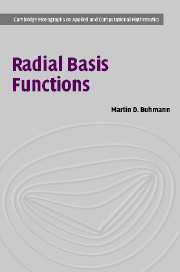Book contents
- Frontmatter
- Contents
- Preface
- 1 Introduction
- 2 Summary of methods and applications
- 3 General methods for approximation and interpolation
- 4 Radial basis function approximation on infinite grids
- 5 Radial basis functions on scattered data
- 6 Radial basis functions with compact support
- 7 Implementations
- 8 Least squares methods
- 9 Wavelet methods with radial basis functions
- 10 Further results and open problems
- Appendix: some essentials on Fourier transforms
- Commentary on the Bibliography
- Bibliography
- Index
10 - Further results and open problems
Published online by Cambridge University Press: 14 August 2009
- Frontmatter
- Contents
- Preface
- 1 Introduction
- 2 Summary of methods and applications
- 3 General methods for approximation and interpolation
- 4 Radial basis function approximation on infinite grids
- 5 Radial basis functions on scattered data
- 6 Radial basis functions with compact support
- 7 Implementations
- 8 Least squares methods
- 9 Wavelet methods with radial basis functions
- 10 Further results and open problems
- Appendix: some essentials on Fourier transforms
- Commentary on the Bibliography
- Bibliography
- Index
Summary
This book ends with a short chapter that has two goals. The first one is to catch up with some recent results on radial basis function approximation which have not been included in the main body of the book, so as to keep the book on a sufficiently introductory level and homogeneous as to the direction of the results. Nonetheless, there are many additional, new results which deserve to be mentioned in a monograph like this about radial basis functions. We take care of some of them by way of a short summary of results with a reference to a cited paper or book that is suitable for further study.
The second one is to mention several open problems that have, as far as the author is aware, not yet been solved at the time of writing this book and which are, partly, in close connection with the recent results in this chapter. (Since writing this book was a long term project, some very recent solutions may almost certainly have been overlooked by the author.) We hope to raise interest in the reader in those problems as subjects of general further, perhaps their own, research work.
Further results
This section enlists and briefly discusses a number of further results in the analysis of radial basis functions.
One of the very recent developments under much investigation now is the idea of the so-called radial basis function multilevel methods.
- Type
- Chapter
- Information
- Radial Basis FunctionsTheory and Implementations, pp. 231 - 239Publisher: Cambridge University PressPrint publication year: 2003



